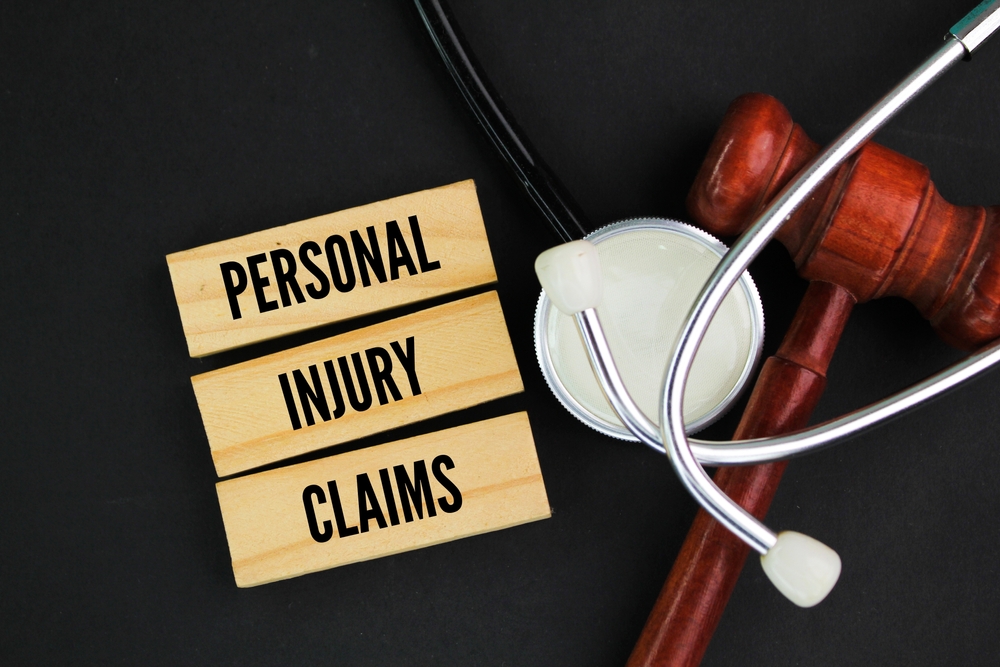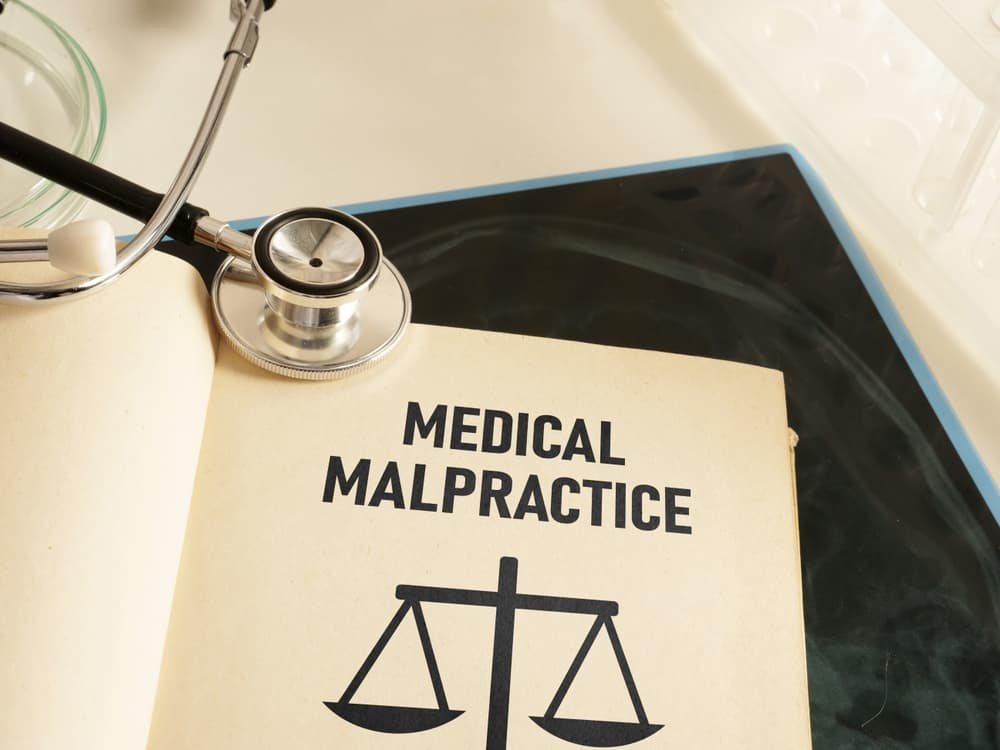When individuals and entities are negligent, many occurrences may occur, including premises accidents, motor vehicle collisions, and medical malpractice. Sometimes, Travelers may be the insurance company for the at-fault party.
When dealing with a large insurance company like Travelers, you need a skilled legal team advocating for you. This is because insurance companies will do everything possible to undervalue or outright deny your claim.
Our experienced car accident attorneys can negotiate with Travelers on your behalf or litigate your case to a resolution in court.
Types of Personal Injury Claims

Personal injury claims arise when someone suffers an injury due to another person’s negligence. Several common types of personal injury claims frequently result from such negligence:
- Car Accidents — Car accidents are among the most prevalent causes of personal injury claims. When a driver fails to drive responsibly, whether through speeding, distracted driving, or driving under the influence, they can be held liable for any resulting injuries. Victims of car accidents can suffer from a range of injuries, from cuts and bruises to life-altering conditions like spinal cord injuries or traumatic brain injuries.
- Slip and fall Accidents — Slip and fall accidents occur when someone slips, trips, or falls due to hazardous conditions on someone else’s property. These hazards may include wet floors, uneven surfaces, poor lighting, or unmarked obstacles. Property owners are typically responsible for maintaining a safe environment; if they fail to do so, they can be liable for injuries sustained on their premises.
- Medical Malpractice — Medical malpractice claims arise when a healthcare provider fails to deliver the standard of care expected in the medical community, resulting in injury to the patient. This can include misdiagnosis, surgical errors, medication mistakes, or inadequate follow-up care. Medical malpractice can lead to severe consequences for patients, including worsening of the original condition, new injuries, or even death.
- Workplace Accidents — Workplace accidents can happen in any job environment, from construction sites to offices. Common causes include unsafe working conditions, lack of proper training, or defective equipment. Employers have a duty to ensure a safe workplace, and failure to do so can lead to serious injuries, such as fractures, burns, or repetitive strain injuries. Workers’ compensation laws usually govern these claims, providing injured employees with benefits without needing to prove employer negligence.
In all of these cases, the key element is negligence. When someone fails to act reasonably, leading to another person’s injury, they can be legally accountable. Personal injury claims help victims seek compensation for their injuries, covering medical bills, lost income, and pain and suffering.
Personal Injuries Resulting from Negligence

Injuries resulting from someone else’s negligence can be both physical and mental. These injuries can have lasting effects on a person’s life. Here are some common categories of injuries that result from others’ negligence:
Physical Injuries
Physical injuries are the most obvious type of harm. These injuries can vary in severity and can significantly affect a person’s ability to live their daily life.
- Fractures and Broken Bones — These often occur in car accidents, slip and falls, and workplace accidents. Broken bones can be painful and may require long periods of healing and rehabilitation.
- Spinal Cord Injuries — These can be life-changing, leading to partial or complete paralysis. They often result from severe car accidents, falls, or sports injuries.
- Traumatic Brain Injuries (TBIs) — TBIs are due to a blow to the head. They can result in memory loss, cognitive difficulties, and even personality changes. Car accidents and falls are common causes.
- Burns — Burns can result from fires, chemical spills, or hot surfaces. They can cause severe pain, scarring, and long-term physical and emotional suffering.
- Open Cuts and Lacerations — These can range in severity and may result from broken glass, sharp objects, or machinery.
Mental and Emotional Injuries
Mental and emotional injuries are less visible but can be just as damaging as physical injuries. They often occur alongside physical injuries but can also happen independently.
- Post-traumatic Stress Disorder (PTSD) — PTSD can develop after experiencing or witnessing a traumatic event, such as a car accident or violent attack. Symptoms include flashbacks, severe anxiety, and uncontrollable thoughts about the event. This condition affects a person’s ability to function and enjoy life.
- Anxiety — Anxiety disorders can develop after an injury or traumatic event. Symptoms include constant worry, fear, and panic attacks.
- Emotional Distress — This broad category includes various emotional responses to trauma, such as grief, anger, and shock. It can affect a person’s ability to interact with others and handle daily activities.
- Loss of Enjoyment of Life — This occurs when an injury prevents someone from engaging in activities they once enjoyed. This can result from both physical limitations and emotional distress.
Injuries due to negligence can have wide-ranging effects on a person’s physical health and mental well-being. Seeking appropriate medical and psychological treatment, as well as legal assistance, is crucial for recovery and justice.
How Our Personal Injury Lawyers Handle a Claim Where Travelers Is Involved
Handling a Travelers Insurance claim requires a structured and strategic approach to ensure the injured party receives fair compensation. Here’s how our lawyers manage such cases from start to finish:
- Consultation and Evaluation — The process begins with an initial consultation in which our personal injury lawyers meet with the potential client to understand the details of the incident. During this phase, we gather essential information, such as medical records, accident reports, and correspondence with Travelers Insurance. We assess the strength of the case by evaluating the evidence of negligence and the extent of the injuries. This evaluation helps determine the potential for a successful claim and the appropriate legal strategy.
- Investigation and Evidence Collection—After the initial consultation, our legal team conducts a thorough investigation. This involves collecting and reviewing all relevant evidence, including witness statements, photographs of the accident scene, and expert opinions. Our lawyers may also consult with medical professionals to document the extent of injuries and their effect on the client’s life. This evidence is crucial for establishing liability and proving the severity of the damages to Travelers Insurance.
- Filing the Claim — Once we have gathered sufficient evidence, our injury lawyers prepare and file the claim with Travelers Insurance. This includes submitting a detailed demand letter outlining the facts of the case, the injuries sustained, and the compensation sought. The demand letter serves as the formal request for payment supported by the collected evidence and medical documentation.
- Negotiations with Travelers Insurance—After we file the claim, our lawyers negotiate with Travelers Insurance. We aim to reach a fair settlement that adequately compensates the client for medical expenses, lost income, pain and suffering, and any other damages. Negotiations involve back-and-forth discussions in which Travelers Insurance may offer a settlement that is lower than the client’s actual needs. Our lawyers advocate strongly for the client, using the evidence and legal arguments to push for a better offer.
- Legal Action If Necessary — Our lawyers are prepared to take your case to court if negotiations do not lead to a satisfactory settlement. This involves filing a lawsuit against the at-fault party and possibly Travelers Insurance, depending on the circumstances. We prepare for trial by presenting all collected evidence, preparing witnesses, and developing a strong legal argument.
- Resolution and Compensation — The case concludes with either a settlement or a court verdict. Our personal injury attorneys ensure that the insurance company promptly pays any agreed-upon compensation and that our client’s interests are fully represented throughout the process.
Handling a personal injury claim with Travelers Insurance involves careful planning, thorough investigation, and skilled negotiation to secure the best possible outcome.
Taking a Travelers Claim to Trial

In a jury trial involving a Travelers Insurance claim, the courtroom process is designed to determine liability and the amount of compensation due to the injured party. Here is a step-by-step overview of what happens during the trial:
- Jury Selection — The trial begins with selecting a jury. Both the claimant’s (plaintiff’s) attorney and the at-fault party’s (defendant’s) attorney question potential jurors to ensure they can be impartial. The goal is to choose a group of people who will fairly evaluate the evidence and make a decision based on the facts presented.
- Opening Statements — Both sides present their opening statements once attorneys have selected the jury. The plaintiff’s attorney outlines the case, explaining how the injury occurred, who is at fault, and the compensation sought. The defense attorney does the same, but from their perspective, they aim to challenge the plaintiff’s version of events and present their own narrative.
- Presentation of Evidence — After opening statements, the plaintiff’s personal injury attorney presents their case first. This includes calling witnesses to testify, submitting physical evidence, and introducing documents such as medical records or accident reports. The attorney for the plaintiff may call expert witnesses, such as doctors or accident reconstruction specialists, to provide professional opinions on the injuries and the circumstances of the accident. The defense then presents its case. They may call their own witnesses, present counter-evidence, and try to disprove the plaintiff’s claims or diminish the perceived severity of the injury. Both sides can cross-examine each other’s witnesses, challenging their credibility and the validity of their testimony.
- Closing Arguments — After both sides have presented their evidence, they deliver closing arguments. This is where each attorney summarizes the key points of their case and argues why the jury should find in their favor. The plaintiff’s attorney will emphasize the effects of the injury and the justification for the requested compensation. The defense attorney will argue why the jury should reject or reduce the plaintiff’s claims.
- Jury Deliberation—Following the closing arguments, the jury deliberates. They review the evidence, discuss the case, and work towards a verdict. Depending on the complexity of the case, this process can take a few hours or several days.
- Verdict and Judgment — Once the jury reaches a decision, they return to the courtroom to deliver their verdict. The verdict will determine whether the defendant is liable and, if so, the amount of compensation the plaintiff will receive. If the jury finds in favor of the plaintiff, the court will issue a judgment based on the jury’s decision.
The trial's outcome can significantly affect the injured party’s compensation and resolution of their claim.
Recoverable Compensation in a Travelers Claim

In a personal injury claim involving Travelers Insurance, you can recover compensation to cover various aspects of the harm you have suffered. The following is a breakdown of the types of losses that you might have:
- Medical Expenses—This category includes all costs related to treating your injuries, including hospital bills, doctor’s visits, medical procedures, prescriptions, therapy, and any future medical care. Those expenses are also included if the injury has long-term effects, such as the need for ongoing treatments or special medical equipment.
- Lost Income — If your injury causes you to miss work, you can seek compensation for your past lost income and any future diminished earning capacity.
- Pain and Suffering — Pain and suffering damages include compensation for the discomfort, anguish, and decreased quality of life you experience. Unlike medical expenses and lost income, pain and suffering damages are less tangible and are calculated based on your injury's severity and long-term repercussions.
- Emotional Distress — In addition to physical pain, you may also receive compensation for the emotional suffering your injury caused. This can include anxiety, depression, or trauma resulting from the accident or its aftermath. Emotional distress damages recognize the psychological effects of the injury on your overall well-being.
- Loss of Consortium — If your injury affects your relationship with your spouse or partner, you may claim damages for loss of consortium. This type of compensation covers the effect of your injury on your marital relationship, including the loss of companionship, support, and intimacy.
- Property Damage — If the injury resulted from an accident that damaged your personal property, such as a vehicle, you can seek compensation for repair or replacement costs. This ensures you are reimbursed for the financial loss from damaged or destroyed property.
- Punitive Damages — In some cases, you may receive punitive damages if the defendant’s actions were particularly egregious or reckless. These damages intend to punish the defendant and deter similar conduct in the future. The court awards these in addition to compensatory damages.
Speak with a Knowledgeable Personal Injury Lawyer Today
Settling or litigating a personal injury claim involving Travelers can be a complicated process to handle on your own. Our experienced personal injury lawyers can fight Travelers on your behalf in pursuit of the financial compensation you deserve.







